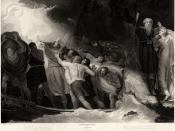The Tempest. An Imperialist Heaven or Hell?
Shakespeare lived and wrote in the Elizabethan age, a time when his society was branching out and making itself known throughout the world by colonizing other cultures. Great Britain was reaching for new heights of power. In the play Shakespeare questions the value of this new concept of British imperialism. The Tempest is called Shakespeare's American play, because he calls into question England's right to colonize other nations, much as American colonists did with America 200 years later.
The Tempest was Shakespeare's last play. For his entire life he had written plays to please the Queen. For this play it appears he made a controversial statement by challenging the values of his Queen and his country.
Evidence of this is abundant in the play. The story rotates around the fact that Prospero, a European noble, had imposed himself on an island, already inhabited.
Prospero is depicted as a worthy man, who was usurped from his throne. The reader has automatic sympathy for the character. This allows him more leeway for wrong doing by creating room for it within the reader's mind. Prospero came to the island with his daughter to find it already inhabited by two savages. Upon arrival, Prospero brought his "new" ideas with him, and began to force them upon these two savages, Sycorax and Caliban. He believed that his new ideas were better, such as slavery opposed to freedom, which he imposed on Caliban.
"Dull thing, I say so; he, that Caliban,
Whom now I keep in my service."
(Act. I, Sc. II, Ln. 285,6)
This view of whose ideas were better is an obvious matter of opinion, one of the biggest drawbacks to transforming old ideas into new.
Prospero was the first male that Caliban had seen...



Comment
this essay helped me very much in understanding the book,
thanx
0 out of 0 people found this comment useful.